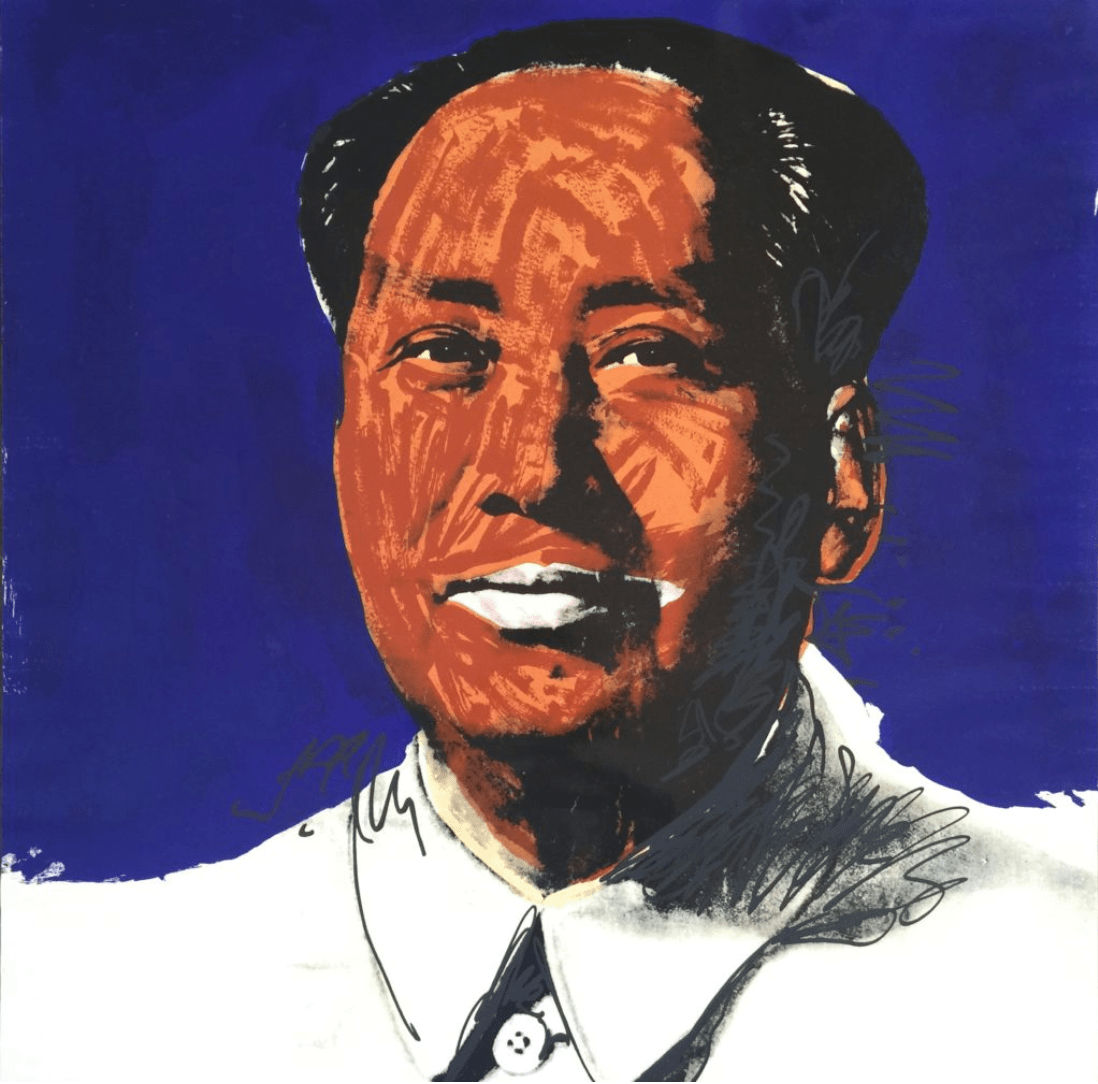-
Artworks

Andy Warhol
Mao F.S. II 98, 1972Screen print on Beckett High White Paper36 x 36 in
91.4 x 91.4 cmEdition of 250 plus 50 APSeries: MaoCopyright Andy WarholFurther images
Andy Warhol's Mao series, created in 1972, stands as a notable departure from his earlier subjects and marks a significant shift towards exploring political figures and power in his art....Andy Warhol's Mao series, created in 1972, stands as a notable departure from his earlier subjects and marks a significant shift towards exploring political figures and power in his art.
Warhol's Mao 98 print shows the subject with a brown face and blue background, making it one of the most desirable Mao prints for collectors since they are not often for sale in excellent condition.The Mao series comprises a collection of silkscreen prints that depict the iconic image of Mao Zedong, the Chairman of the Communist Party of China. Warhol based these prints on a famous photograph of Mao, portraying the leader in a frontal and almost propagandistic style, much like the images distributed during the Cultural Revolution in China.
Warhol's depiction of Mao captures the enigmatic and authoritative aura surrounding the political figure, yet the repetition of Mao's image in the series adds a layer of ambiguity and contemplation. By repeating the same image in various colors and compositions, Warhol challenges the singular authority of the subject and raises questions about the idolization of political figures in mass media.
The series reflects Warhol's interest in the intersection of politics and popular culture, as well as his fascination with celebrity and fame. Mao, an influential political figure, is reimagined by Warhol within the context of mass production and consumerist aesthetics, blurring the lines between political power and celebrity status.
Warhol's Mao series sparked discussions about the commodification of political figures and the cult of personality surrounding influential leaders. Through these prints, he provokes contemplation about the manipulation of images in politics and the pervasive influence of media in shaping public perception.
Despite its departure from Warhol's more mainstream subjects, the Mao series remains a significant commentary on the intersections of politics, power, and media in contemporary society. It stands as a testament to Warhol's ability to provoke thought and dialogue through his art, challenging viewers to reconsider the nature of authority and representation in the realm of popular culture and politics.
Exhibitions
Various retrospectives of Warhol's work have been held at prestigious institutions such as the Museum of Modern Art (MoMA) in New York City, Tate Modern in London, and the Art Institute of Chicago. These retrospectives often include his Mao portraits among other iconic works.Literature
"Warhol's Chinese Portrait: From Mao to Now" by Michael FitzGerald - This book examines Warhol's fascination with Mao Zedong and the cultural impact of his portraits.%3Cdiv%20class%3D%22artist%22%3EAndy%20Warhol%3C/div%3E%3Cdiv%20class%3D%22title_and_year%22%3E%3Cspan%20class%3D%22title_and_year_title%22%3EMao%20F.S.%20II%2098%3C/span%3E%2C%20%3Cspan%20class%3D%22title_and_year_year%22%3E1972%3C/span%3E%3C/div%3E%3Cdiv%20class%3D%22medium%22%3EScreen%20print%20on%20Beckett%20High%20White%20Paper%3C/div%3E%3Cdiv%20class%3D%22dimensions%22%3E36%20x%2036%20in%3Cbr/%3E%0A91.4%20x%2091.4%20cm%3C/div%3E%3Cdiv%20class%3D%22edition_details%22%3EEdition%20of%20250%20plus%2050%20AP%3C/div%3E%3Cdiv%20class%3D%22series%22%3E%3Cspan%20class%3D%22artwork_caption_prefix%22%3ESeries%3A%3C/span%3E%20Mao%3C/div%3ERelated artworks-
 Andy WarholMao F.S. II 93, 1972
Andy WarholMao F.S. II 93, 1972 -
 Andy WarholMao Portfolio, 1972
Andy WarholMao Portfolio, 1972 -
 Andy WarholMao F.S. II 91, 1972
Andy WarholMao F.S. II 91, 1972 -
 Andy WarholMao F.S. II 92, 1972
Andy WarholMao F.S. II 92, 1972 -
 Andy WarholMao F.S. II 94, 1972
Andy WarholMao F.S. II 94, 1972 -
 Andy WarholMao F.S. II 95, 1972
Andy WarholMao F.S. II 95, 1972 -
 Andy WarholMao F.S. II 96, 1972
Andy WarholMao F.S. II 96, 1972 -
 Andy WarholMao F.S. II 97, 1972
Andy WarholMao F.S. II 97, 1972 -
 Andy WarholMao F.S. II 90, 1972
Andy WarholMao F.S. II 90, 1972 -
 Andy WarholMao F.S. II 99 , 1972
Andy WarholMao F.S. II 99 , 1972 -
 Andy WarholMao F.S. IIIA 6 , 1978
Andy WarholMao F.S. IIIA 6 , 1978 -
 Andy WarholMao F.S. II 125A, 1974
Andy WarholMao F.S. II 125A, 1974
-
Join our mailing list
* denotes required fields
We will process the personal data you have supplied in accordance with our privacy policy (available on request). You can unsubscribe or change your preferences at any time by clicking the link in our emails.
This website uses cookies
This site uses cookies to help make it more useful to you. Find out more about cookies.













